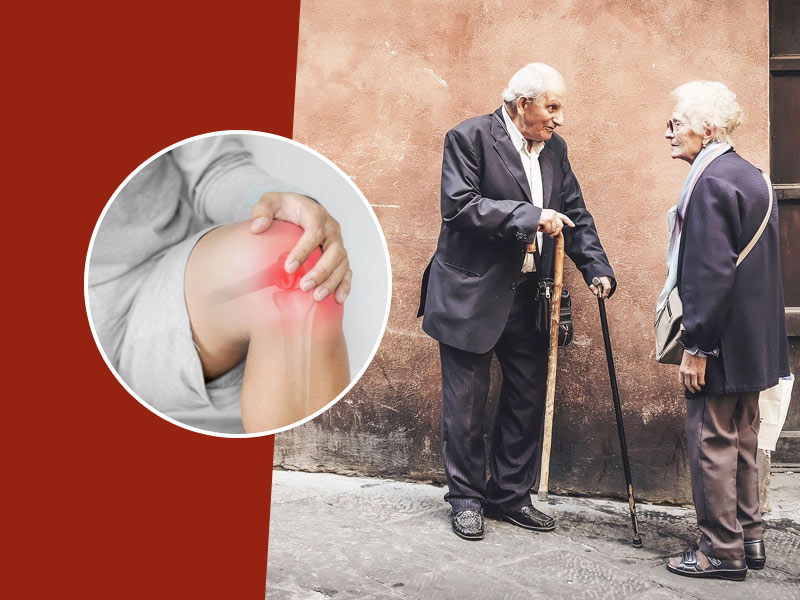
Knee pain in old age isn’t uncommon. As one ages, it is common to feel slight aches while bending or straightening the knee or climbing up and down the stairs. Knee -- the largest joint in our body, undergoes wear and tear as we age. There are other factors as well. As we age, the muscles get weak. Weakened hip and leg muscles put pressure on the knee, thus resulting in pain. Similarly, in a person who is overweight, his/her knees will have to bear more pressure. Also, many suffer from conditions such as osteoarthritis, in which the cartilage that protects the knee bones breaks down, resulting in pain.
Table of Content:-

(Photo Credit: Unsplash)
Whatever be the cause, there are things you can do about it. There are home-based remedies that you can try to get relief from knee without having to pop pain-relieving pills:
1# Heat And Cold Therapy
Heat helps alleviate pain. So applying a hot water bottle to the aching area can help. Applying a cold compress can help with inflammation. So put some ice on a sheet and apply it to the inflamed area. However, first determine the cause of the pain as using the wrong remedy can make matters worse. For eg applying heat to an inflamed area can aggravate the pain.
Also read: Degenerative Knee Problems Rising In Younger Adults, Are You At Risk? Let’s Find Out
2# Turmeric

(Photo Credit: Pixabay)
Who knew that this common spice known for its anti-inflammatory properties and used extensively in Indian food can help alleviate knee pain. Turmeric contains curcumin, an anti-inflammatory compound, which helps in reducing pain.
3# Massage
Who can challenge the benefits of hot oil massage? In case of knee pain, massage your joint with sesame or mustard oil. Mildly heat it, if inflammation isn’t the cause of pain. Also, add a pinch of turmeric powder for better results. You can do this whenever you feel the pain
4# Ginger
Another article found readily in our kitchens is believed to help with knee pains, and that is none other than ginger. This kitchen herb has anti-inflammatory properties, especially beneficial for those suffering from arthritis. You can consume it in any form you like. Add it to your curry, or have ginger tea. Also, right after you go to bed, you can have milk with turmeric and ginger in it.
5# Epsom salt
Another object known for its anti-inflammatory and pain-relieving qualities is Epsom salt. Sounds fancy? Epsom salt is nothing but ‘sendha namak’ found readily in the kitchen. If you suffer from knee pain, take some hot water and add some Epsom salt to it. Soak your knees in it until it gets cold.
6# Methi
Yet another kitchen herb that can help you with knee pain is fenugreek, commonly known as methi. It contains antioxidants and has anti-inflammatory properties that can help with pain. What you can do is, soak a tablespoon of methi seeds in a glass of water and keep it overnight. In the morning, sieve the seeds and drink the water. Also, you can add powdered methi to your food.
7# Food
Other than these you can eat several foods that are good for the joints, such as walnuts, flaxseeds, sesame seeds and amla. Another medicinal herb that can help is ‘giloy’. You can chew the stem, or use it in powdered form. You can also get it from the market.
8# Exercise
Although resting when suffering from knee pain can help you with the pain. However, it can also stiffen joints and muscles that could cause trouble later. So do light exercises. Mind and body exercises such as Yoga, or China’s Tai Chi can help. These are easy to do, help with flexibility and are good for joints. Also, they involve breathing exercises, which reduce stress and induces relaxation. This can help manage chronic pain in the long run.
Also read: Why Is Knee Replacement Surgery Done? Know The Possible Side-Effects Of This Surgery
You can try these remedies to get respite from the pain. However, if it gets moderate or severe, immediately consult a medical practitioner, who would diagnose the cause and start the reason-specific treatment.
Read more articles on Home Remedies
Also watch this video
How we keep this article up to date:
We work with experts and keep a close eye on the latest in health and wellness. Whenever there is a new research or helpful information, we update our articles with accurate and useful advice.
Current Version